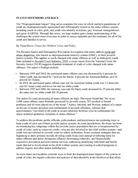Youth charged with status offenses have engaged in behaviors that are prohibited under law only because of their age, such as skipping school, running away, or violating curfew. Disobedient but not delinquent, these young people have acted out in ways that raise the concern of the adults in their lives. Responding to these cases in court can lead to deeper juvenile justice system involvement, including detention or placement in a residential facility, and ultimately, may do little to address the deeper personal, familial, community, and systemic issues that can underlie status offense behaviors.
Models for Change supported research, policies and practices that appropriately respond to the troubled but not delinquent behavior of status offenders. The Status Offense Reform Center (SORC) of the Vera Institute for Justice served as a clearinghouse of information and assistance for practitioners and policymakers in juvenile justice, with a focus on encouraging and showcasing strategies to safely and effectively divert non-delinquent youth from the formal juvenile justice system.
Featured publications
Initiative tools, research, knowledge, and innovations to promote reform
-
 Status Offenders and Race
Status Offenders and Race
- Dec 12, 2014, Center for Children's Law and Policy
- Status Offenders and Race
-
 Advancing Juvenile Justice: Recommendations in Three Key Areas
Advancing Juvenile Justice: Recommendations in Three Key Areas
- Dec 8, 2014, Mental Health and Juvenile Justice Collaborative for Change
- As OJJDP considers how best to carry out its mission, three core issues stand out for their intense need, their proven potential for reform, and the opportunities they offer OJJDP to lead significant…
-
 Keeping Kids Out of Court: Rethinking Our Response to Status Offenses
Keeping Kids Out of Court: Rethinking Our Response to Status Offenses
- Oct 8, 2014, Status Offense Reform Center
- Status offenses are behaviors that are problematic but non-criminal in nature —such as running away from home, skipping school, or violating curfew—which are prohibited under the law only…
-
 Runaway Youth: A Research Brief
Runaway Youth: A Research Brief
- May 28, 2014, Sydney McKinney
- Running away is a status offense in 39 states. While the exact number of youth who run away from home each year is unknown, evidence suggests that most return home within a few days. This research…
-
 SORC Toolkit Module 3: Planning and Implementing System Change
SORC Toolkit Module 3: Planning and Implementing System Change
- Apr 30, 2014, Status Offense Reform Center
- Toolkit for Status Offense System Reform
Transforming a juvenile justice oriented status offense system – one that is likely complex and has been in place for decades – into one that is…
More publications »
Leading organizations
Network partners advancing reforms and providing assistance, lessons, and support
- Vera Institute of Justice
- (212) 334-1300
More contacts »
Share